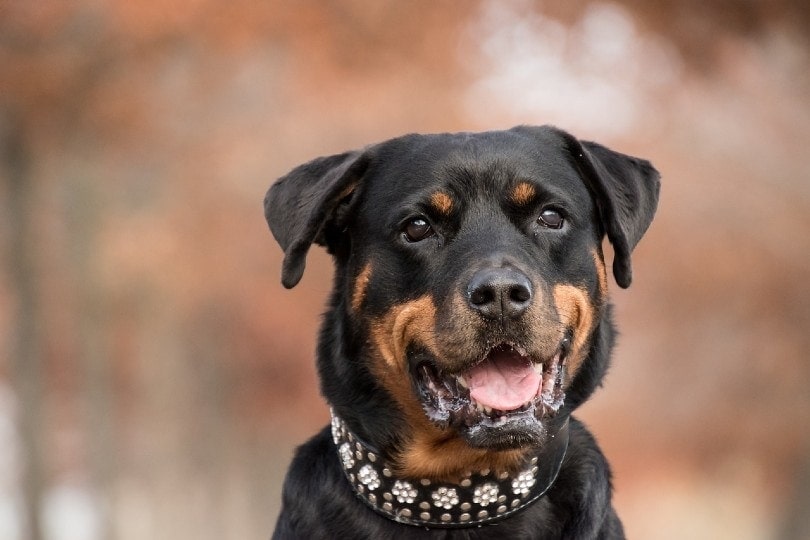German Wirehaired Pointer vs German Shorthaired Pointer: Differences (With Pictures)
By Jordyn Alger
Updated on
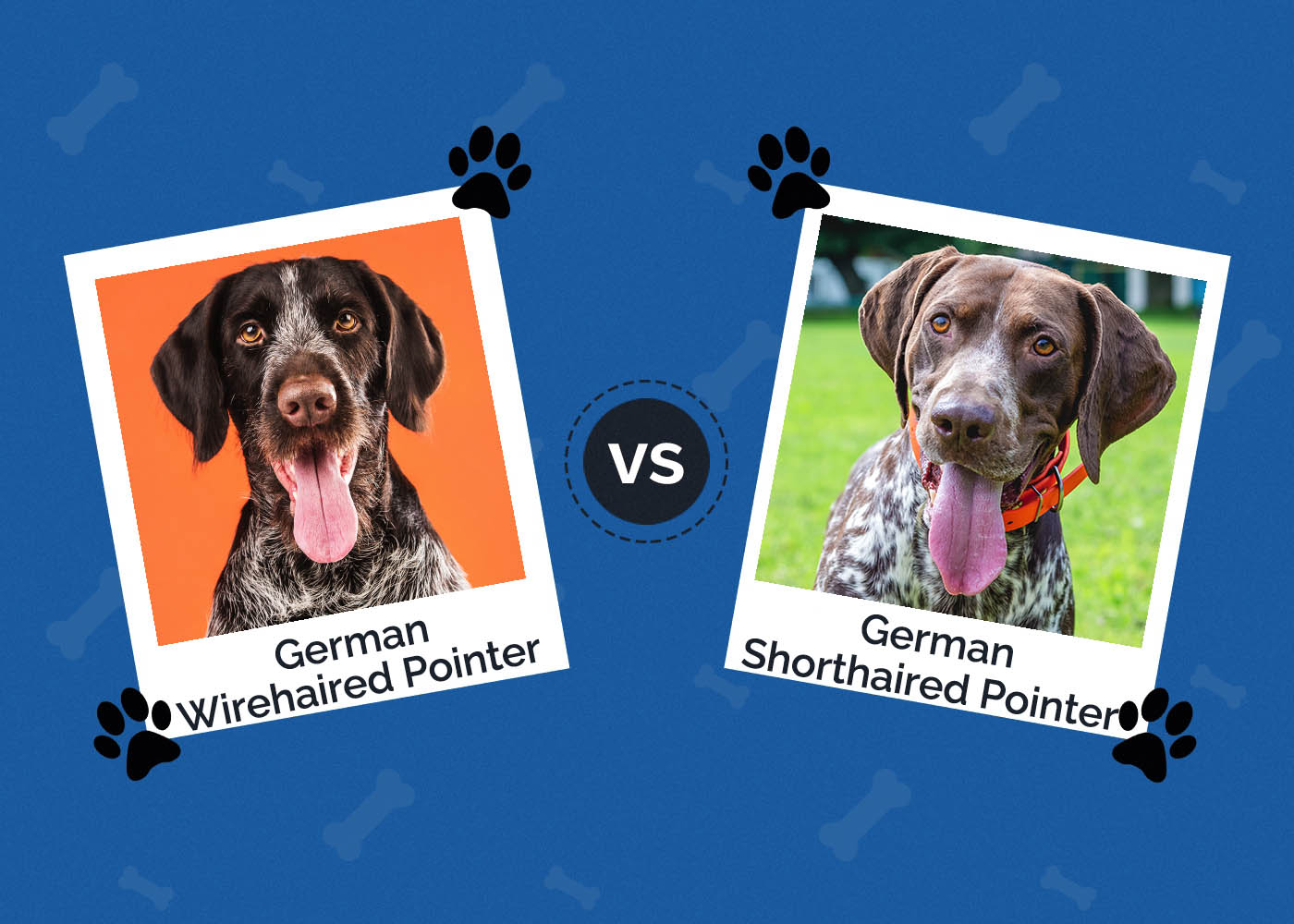
Click to Skip Ahead
While German Wirehaired Pointers and German Shorthaired Pointers have remarkably similar names and origins, both being bred as German hunting dogs, they are different breeds. In terms of appearance, the German Wirehaired Pointer has a rougher, longer coat than the German Shorthaired Pointer. Similarly, German Wirehaired Pointers are slightly larger than German Shorthaired Pointers.
In terms of personality, both breeds share many similarities. They are energetic animals with friendly dispositions, making them excellent pets for many people. However, there are nuances to their character and care that set the breeds apart from each other. In this article, we’ll look at each breed’s personality and needs to give you a better idea of which family dynamic each dog is most suited to join.
Visual Differences

At a Glance
- Average height (adult): 24–26 inches
- Average weight (adult): 50–70 pounds
- Lifespan: 14–16 years
- Exercise: 1+ hour per day
- Grooming needs: Minimal
- Family-friendly: Yes
- Other pet-friendly: Often
- Trainability: Eager to please, intelligent, and responsive
- Average height (adult): 23–25 inches
- Average weight (adult): 55–70 pounds
- Lifespan: 10–12 years
- Exercise: 1+ hour per day
- Grooming needs: Minimal
- Family-friendly: Yes
- Other pet-friendly: Yes
- Trainability: Intelligent and eager to please

German Wirehaired Pointer Overview
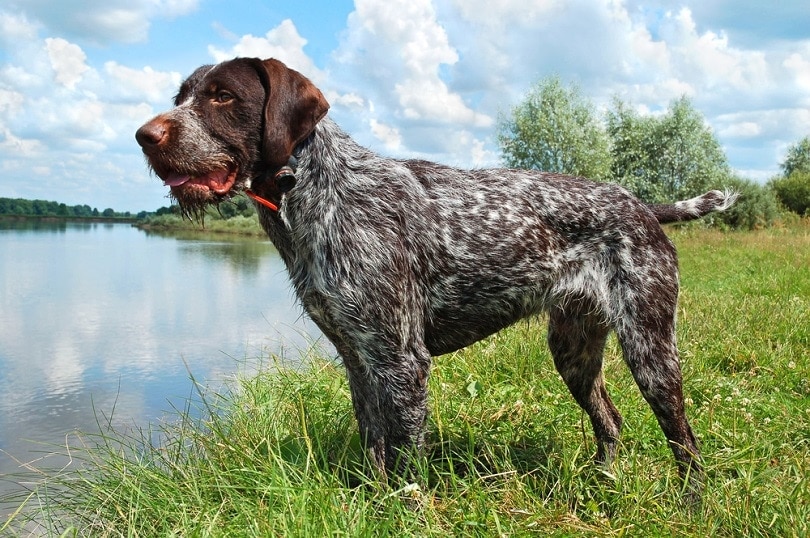
The German Wirehaired Pointer is a versatile gundog bred to endure the great outdoors. His rough, wiry coat provides him with ample defenses against the harshest of weather conditions as well as the coldest of waters, making him an excellent duck hunting companion. The German Wirehaired Pointer is prized for his resilience, agility, and athleticism.
Personality / Character
The German Wirehaired Pointer is a docile dog with a biddable, responsive nature. This temperament makes the breed ideal for hunting; he can wait patiently in the bushes for prolonged periods. However, the German Wirehaired Pointer doesn’t do well with inactivity. If you are looking for a couch potato dog, this breed is not it.
The German Wirehaired Pointer is moderately good with children and other dogs but can occasionally be aggressive with both. He is typically a protective companion, making him wary and unwelcoming to strangers initially, but he tends to warm up to them quickly. Many owners describe the German Wirehaired Pointer as an affectionate, lively companion that is eager to please.
Exercise
The German Wirehaired Pointer is full of energy and is a sporting dog that enjoys outdoor activities, so taking your German Wirehaired Pointer out for regular outside time will be absolutely essential. At least an hour of exercise each day will be necessary to keep your dog happy and healthy. Some activities you can do with your German Wirehaired Pointer include long walks, jogging, swimming, and agility training.
Training
The German Wirehaired Pointer is eager to please his owner, which can make training him easier. He is intelligent and responsive but, at times, can be independent. For this reason, experienced dog owners are better for the German Wirehaired Pointer.
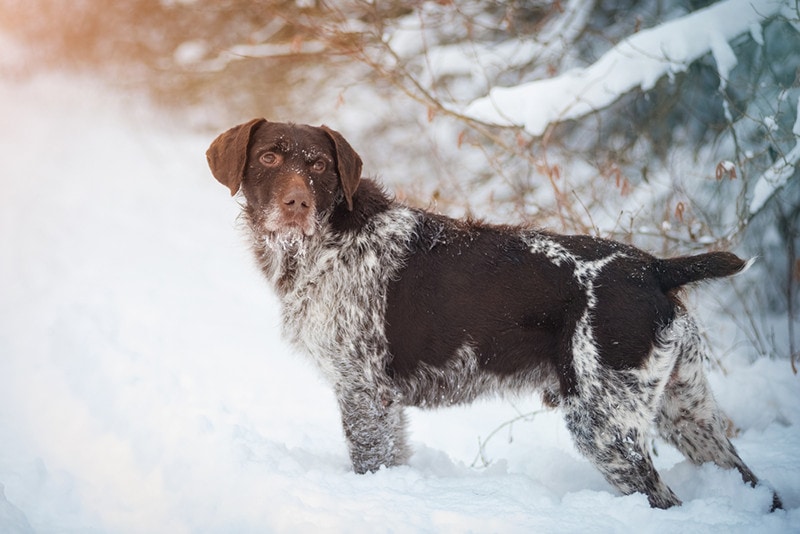
Health & Care
Like any breed, the German Wirehaired Pointer may be predisposed to certain health conditions. These include seizures, hip dysplasia, elbow dysplasia, entropion, and hypothyroidism. Remaining vigilant about your dog’s health is essential in catching these conditions early. Your veterinarian may recommend different tests to check for these conditions during your regular checkups.
Suitable For:
The German Wirehaired Pointer can make a wonderful companion for the right owner. If you are an avid outdoors explorer or a sporty individual, the German Wirehaired Pointer could be the perfect companion to take on your explorations. Energetic families are ideal for this breed since he does not do well without plenty of exercise. First-time dog owners are not recommended for the German Wirehaired Pointer since his occasional stubborn streak may make him a challenge to train.
German Shorthaired Pointer Overview
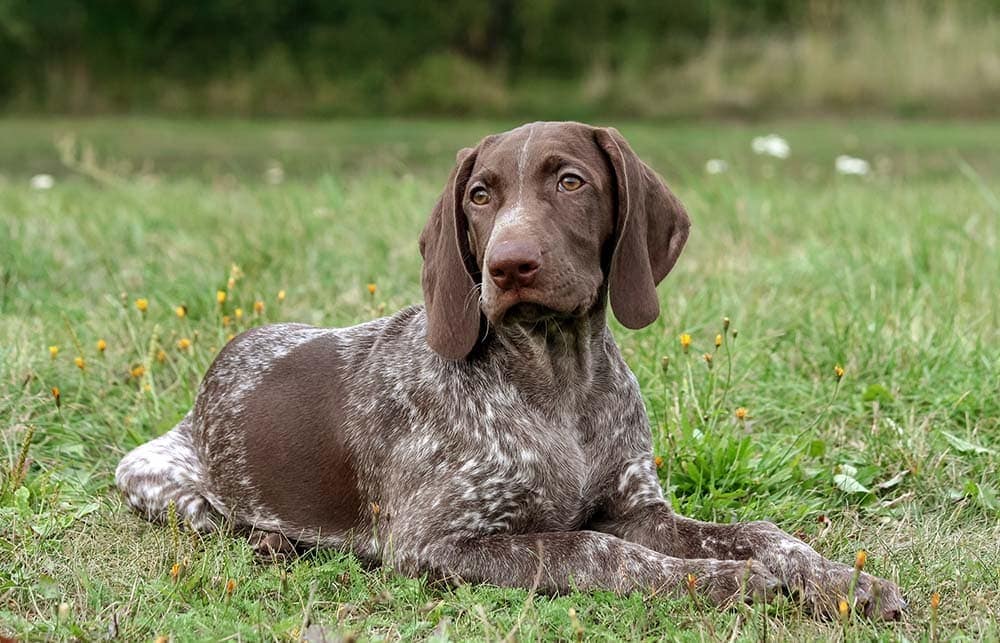
The German Shorthaired Pointer is a versatile hunting dog like the German Wirehaired Pointer. He is considered a jack-of-all-trades in the hunting world, and many consider him the perfect pointing dog. He runs slightly smaller on average than the German Wirehaired Pointer but is just as athletically adept. The German Shorthaired Pointer is known for his enthusiasm, power, and speed.
Personality / Character
The German Shorthaired Pointer is an intelligent, good-natured companion. He is a playful, exuberant dog loaded with energy. For some, the endless energy of the German Shorthaired Pointer may be exhausting, but he tends to mellow out after his first 3 years. Even then, that lively personality never really goes away.
Exercise
This breed requires regular exercise and does not do well when cooped indoors for too long. Running, swimming, and other canine sports are great activities for your German Shorthaired Pointer to participate in. An hour or more of exercise is required to keep them physically and mentally fit. A large backyard will allow them to run and explore when you can’t participate in their activities.
Training
Training your German Shorthaired Pointer is essential, as this intelligent breed may become destructive without adequate mental stimulation. These dogs love to have a purpose, so teaching them new tasks can be enjoyable for both of you. German Shorthaired Pointers are eager to please their owners and easier to train than some dogs, but if you have trouble training them, it’s best to seek professional help.
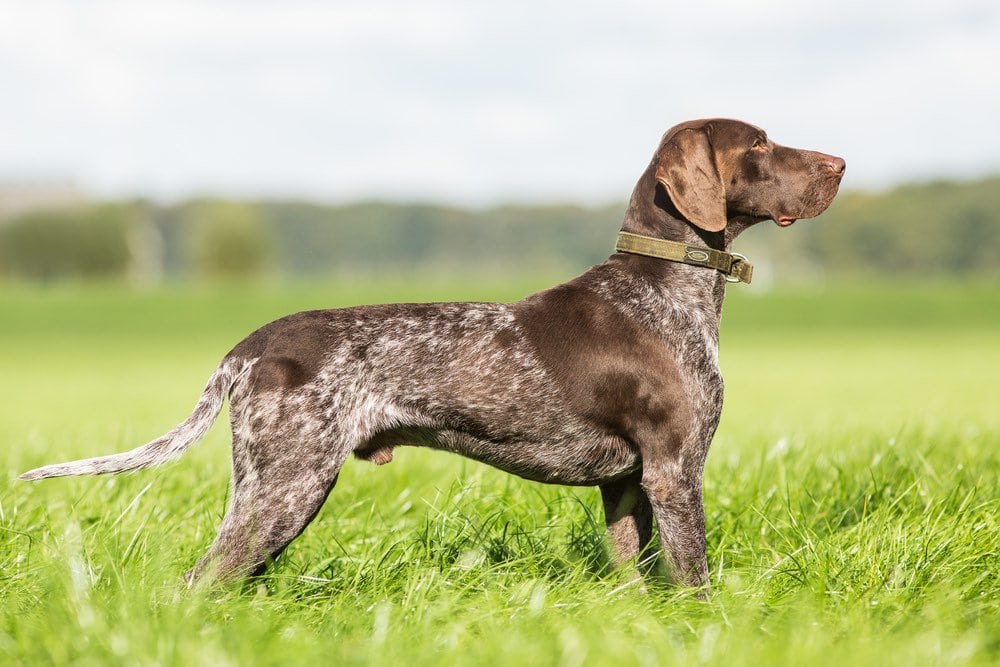
Health & Care
German Shorthaired Pointers are typically healthy dogs but are still prone to specific health conditions. If you have a German Shorthaired Pointer in the home, watch for signs of hip dysplasia, progressive retinal atrophy, and various heart diseases. A severe condition that German Shorthaired Pointers can be affected by is bloat, which can be life-threatening if not treated. Informing yourself of the signs of bloat will allow you to act promptly if your dog should need assistance.
Suitable For:
The German Shorthaired Pointer has many of the same care requirements as the German Wirehaired Pointer, such as an active family and an experienced dog owner to train him properly. However, the German Shorthaired Pointer is a slightly better family dog since he is good with younger children and other dogs. However, having such a high-energy dog while caring for a young child can be incredibly exhausting. If you aren’t sure you have the energy to take care of an active dog and a child simultaneously, the German Shorthaired Pointer may not be right for you.
Which Breed Is Right for You?
Both the German Wirehaired Pointer and the German Shorthaired Pointer require energetic, experienced dog owners who love to engage with their pets. Either breed could be the perfect hunting companion, as they are highly versatile and skilled partners.
The German Wirehaired Pointer is slightly more suited to frigid environments due to his wiry coat, making him ideal for duck hunters or hunters in colder regions. On the other hand, the German Shorthaired Pointer is more suited for families with younger children and other dogs.
In the end, both breeds are exceptional and require similar care needs. Before bringing either of these dogs home, make sure that you can provide him with frequent, vigorous exercise and plenty of outdoor activity. In terms of an outdoor sports partner, there are few dogs quite as adept as these two.
See also:
- Pudelpointer vs. German Wirehaired Pointer: The Differences (with Pictures)
- Wirehaired Pointing Griffon vs German Wirehaired Pointer: Differences (With Pictures)
Featured Image Credit: (L) SandraKoroleva94, Shutterstock | (R) MVolodymyr, Shutterstock


